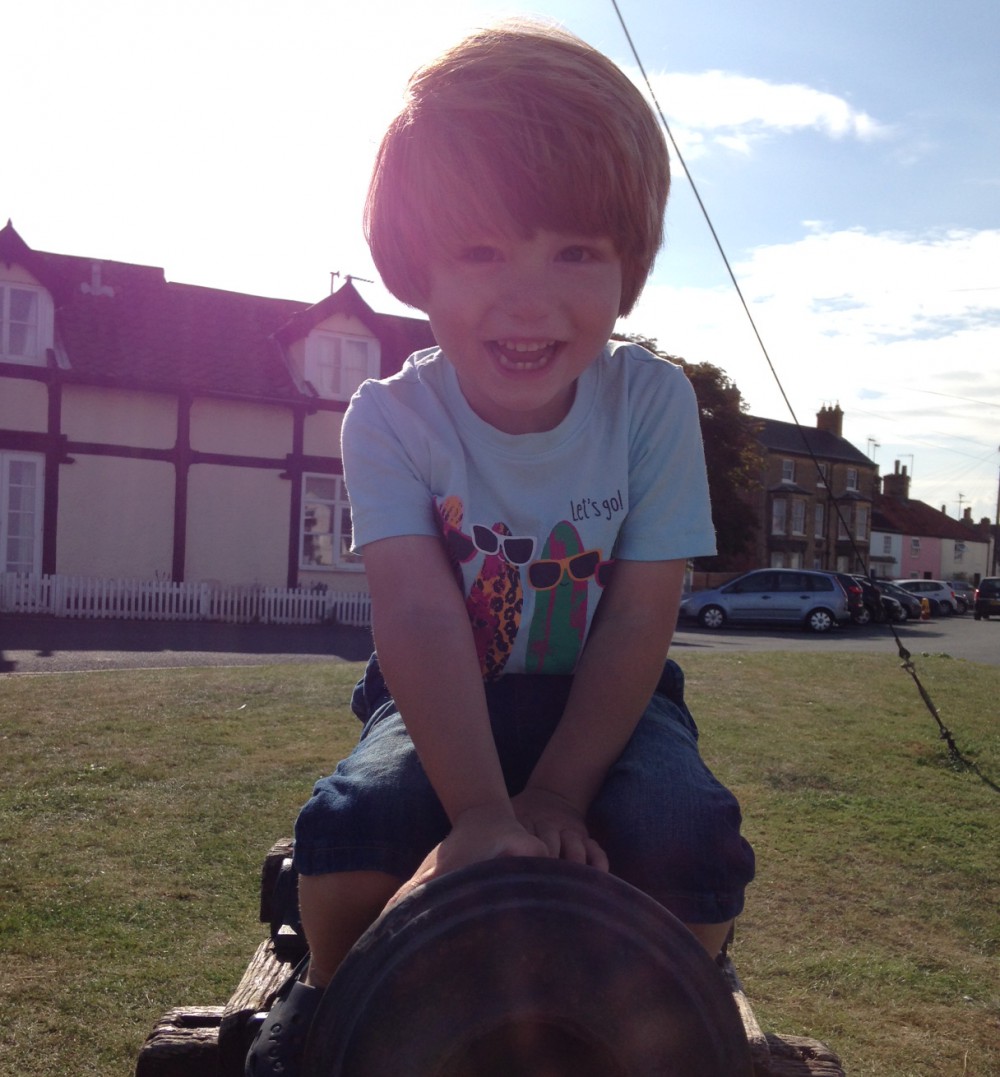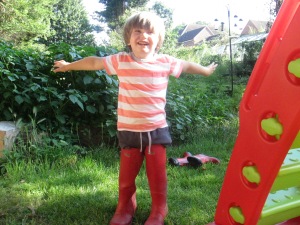Too much screen time will harm your child’s development. I have heard this from more than one professional. They usually add, that although this is true for any child, it is especially the case for autistic children. I agree. In fact, I am constantly trying to find the most effective way to limit screen time for the whole household. The biggest obstacle to that good intention is that a screen equals a peaceful and sometimes blissfully happy child. When you’re used to seeing your child upset for long periods of time,and when you are emotionally drained after navigating a distress-a-thon, it can be particularly hard to resist. I would heartily recommend a screen free hour before bed. The initial hardship surprised me, but when bedtime suddenly became so much easier it was not very hard at all.
A few years ago I had a lesson in what screen time does your brain. My daughter has seizures and was admitted to hospital for tests. She was hooked up to a machine that measured her brain activity. It was displayed on a monitor at the end of her bed, in real time. It was fascinating to watch the readout change depending on what she was doing. When she noticed someone come into the room there was a burst of activity on the monitor. When it was someone she knew well the activity was more pronounced. Conversations produced an active, wiggly line. Singing made the graph so thick with lines they looked like blocks. Laughter took the line to a high peak. When she turned to watch the TV however, the lines indicating brain activity immediately flatlined. It would happen even if she just glanced at the TV for a few seconds in the middle if a conversation. A similar effect when she looked at a laptop screen. After seeing that I wanted to never watch TV again. Certainly I didn’t want to let my children watch TV anymore. I did though.
I have always loved TV, I even like to have it on just as company, I find it reassuring. I love to be completely absorbed in a drama series, to find new comedy, and I have learnt a lot from TV. I thought Science was boring and that Maths was irrelevant until TV brought them to life for me. I do love it a little less now, and I make it more of a conscious decision to watch rather than an automatic habit.
Leo seems to have inherited, or learnt, my love of TV. From four months old he couldn’t take his eyes off it, and I reassured myself with the thought that it was just colours and lights to him, and he wasn’t actually watching it and therefore it wasn’t doing any harm. I was probably wrong, and I probably knew it too.
But Leo has learnt things from TV too. Tree Fu Tom taught him to jump. It is a very irritating but well-intentioned show that tries to get kids to move as they watch. For Leo it did more than that. All the other kids his age could already jump but Leo , who has great trouble with copying any movement was still struggling to co-ordinate the move. We tried to teach him and he got more and more annoyed with us and himself. Then one day Tree Fu Tom said jump and he jumped.
That brings me to another concern about screens; that they make children (and adults) sedentary. And on follow all the things that a sedentary life brings. Autistic kids have enough challenges without that on top. Leo however, tends to watch TV ‘on the move’. He runs in circles and jumps up and down (now that he can) and is generally very active. So I am able to let myself off the hook on that one, to some extent at least. More worrying for me is that it is a time thief. What could we have done instead of watching TV? Most of the time, almost anything would be better.
So, given my ongoing battle to limit screen time, it was an interesting decision to buy my autistic son an iPad for his third birthday. Well, we decided on an iPad, it could be any tablet device thing. I sometimes regret it, and I definitely regret installing a YouTube app, but I think the benefit/detriment balance is at least even. No doubt there are professionals who would disagree. There are days when I disagree with myself.
The biggest positive that the iPad has given me is the knowledge that my son is not developmentally delayed. Officially he still is, but I know it’s not true. Within days of having the ipad he was performing tasks he struggled to do in 1:1 sessions. He was following complex instructions, completing puzzles and identifying words with ease. I would watch over his shoulder, expecting to have to help him out, only to find him moving on to the next thing. I don’t know if it is the removal of social demands from the equation that makes it easier, or if he finds the screen so compelling he is able to concentrate without being distracted. It all started to fall into place for me:He understands, But he finds it hard to concentrate, to stay on task. This technology can help him to do that, but more than that it has changed my attitude towards him. I no longer question his potential to learn, even on bad days.
It has also helped me to see areas where he does struggle. Putting things into categories was hard. playing ‘spot the difference’ is still a challenge. Using a screen to try to learn those new things is so much better for him. He is just more open to trying things and making mistakes without so much distress.
It is a useful tool to help him cope in situations where he would otherwise not cope, usually very noisily. We sometimes get disapproving looks, such a young child with his head stuck in a device. But we would get them if he was screaming his head off too (the older a child get the less acceptable it is for them to publicly not cope). I try very hard not to just hand him the iPad if I’m worried he won’t cope. It is important I think, to wait and see what happens. I don’t want him to miss experiences because I assumed it was too much.
It also helps him to wind down after too much input. After school is prime iPad time. Sometimes he is on it too long. And the longer he is on it, the more resistant he is to doing other things, and harder it is for me to take it away from him. And I need to keep an eye on myself, as it is easy for me to justify it in terms of him needing it to wind down. Whereas, in fact maybe It is me who has a need for him to be occupied so that I have time to cook dinner or tidy up in peace. Or I just want the peace.
It has helped him to share things with us. He wants to show me things on the iPad. Not often, but it happens more with the iPad than any other context.
Until recently we also had a communication app installed. It has only been uninstalled as he will soon be getting a dedicated communication device with voice output. It is quite different to the app, so we don’t want him getting too used to the app, which was designed for learning disabled adults rather than autistic children.
During the time we did have it, I had some quite mundane and yet extraordinary ‘conversations’ with my non-speaking son. He woke up one night and was able to tell me that he felt scared and that he was scared of a monster. Every morning I asked him how he was, and using the icons on the screen he would tell me how he felt. Nine times out of ten the answer was ‘happy’, but one morning the answer, was ‘cold’ and he went on to say he wanted to wear his dressing gown. We looked at the hobbies page and he told me that his hobbies were reading books, watching films, running, cooking and fishing. This last one made me cry. He seems so unaware at times, ‘in his own little world’. Fishing is his Dad’s hobby, and it made me realise he wants to be like his Dad, even though at the time he was practically ignoring him. But he just wanted to do and be the same as his dad, just like any three year old. The insight was bittersweet, as it made me realise that I didn’t really know him that well.
Now, the YouTube app. I have fewer nice things to say about this. I should remove it, but it’s like Pandora’s box. The evil has now entered the world and I can’t get it back in. He goes through phases where he returns to his educational apps, but currently his first choice is watching the weirdest things he can find, involving as many of his special interests as possible. There is a whole world out there of people opening toys on camera, filming not very good stories using a bizarre mixture of toys. And covering everything in playdough. The best thing I can say about it is that it has been interesting to me to see what he finds interesting. With no speech he has only limited opportunities to tell me what he likes and doesn’t like. The exact point where he gets bored of something is fascinating. But I’m pretty sure his brain waves are flatlining throughout most of this. And then sometimes I’m not so sure. Seeing him recreate and elaborate on some of the scenes he has watched on YouTube makes me wonder if it is doing more good than I give it credit for. Sounds like not very much, but for a child who finds copying so hard it is very much indeed.
So the fairly predictable conclusion is that screen time is like most things, it can be good in moderation. But how you find the exact balance that suits your own child is not so predictable. There are perhaps more benefits and more dangers for autistic kids – everything always seems to be ‘more’ for autistic kids.
I don’t want to downplay the potential for harm – I have too clear a memory of that brainwave flatline for that. But, it would also have been harmful for me to continue to assume my son was less capable than he really is. It was not just devices and screen time that made me realise that, but they played a pivotal role. And will continue to do so. Apart from the hour before bedtime.

